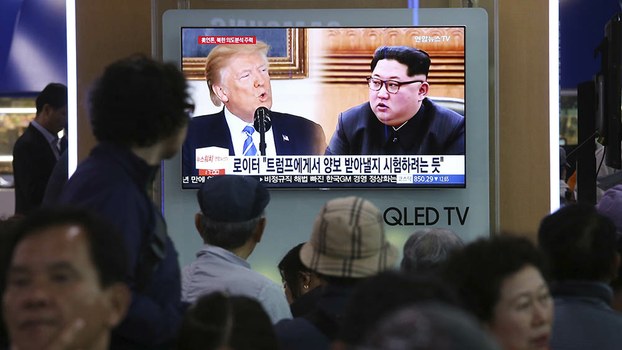




North Korea on Wednesday threatened to scuttle a planned summit between its leader Kim Jong Un and U.S. President Donald Trump over Washington’s push for its unilateral denuclearization, but the White House said it won’t back down on its demands and expects “tough negotiations” with Pyongyang.
In a statement carried by the official Korean Central News Agency (KCNA) on Wednesday, North Korea’s first vice foreign minister Kim Kye Gwan said that if the U.S. “corners us and unilaterally demands we give up nuclear weapons we will no longer have an interest in talks and will have to reconsider whether we will accept the upcoming DPRK-US summit,” using an acronym for the official name of the country.
“I cannot suppress anger over this US move and it is doubtful whether the U.S. really wants to improve ties with the DPRK through dialogue and negotiation,” the statement said.
Last month, during a historic summit with his counterpart in South Korea, Moon Jae-in, Kim Jong Un pledged to rid the Korean peninsula of nuclear weapons, but experts say his definition of denuclearization likely differs from U.S. expectations.
In his statement on Wednesday, Kim Kye Gwan stressed that the North had “already expressed our willingness for a denuclearized Korean peninsula and repeatedly declared that the U.S. must end its hostile DPRK policy and nuclear threats as preconditions.”
The vice foreign minister also lashed out at U.S. National Security Advisor John Bolton, who has previously referred to a “Libyan model” for denuclearizing the North. Late Libyan leader Moamer Khadafi was killed in a popular uprising, backed by a NATO bombing campaign, after ending his country’s nuclear weapons program.
Kim Kye Gwan called Bolton’s words a “highly sinister attempt to enforce the fate of Libya … upon the DPRK.
The warning came shortly after North Korea canceled a high-level talks with South Korea in protest of annually held U.S.-South Korean military exercises, which the North maintains are part of plans for an invasion to topple the Kim regime.
On Wednesday, White House press secretary Sarah Huckabee Sanders said North Korea’s threats to pull out of the Kim-Trump summit, set for June 12 in Singapore, were “something we fully expected.”
“The president is very used to and ready for tough negotiations, and if they want to meet, we'll be ready,” she told reporters in Washington.
“If they don’t, that’s OK too, and we'll continue with our campaign of maximum pressure.”
North Korea has regularly sought to raise tensions ahead of negotiations with the U.S. and South Korea as part of a bid to increase its position in talks.
Vice president of the Seoul-based Asian Institute for Policy Studies Choi Kang told RFA’s Korean Service that the latest warning is likely another attempt by the North to extract more concessions at the upcoming summit.
“The U.S. recently offered a big reward [to North Korea] in return for denuclearization, but generally the U.S. remains strong in its stance,” Choi said, referring to Washington’s pledge to bring investment to the North, which has struggled economically in the face of international sanctions over its weapons program.
“There might be a negative outcome for North Korea if they just go for the U.S.-North summit [without trying to get anything else first] so I think Pyongyang is briefly trying to put the brakes on [the current situation] ahead of the summit.”
China talks
Han Bum Cho, senior research fellow at the Korea Institute for National Unification in Seoul, suggested that the North feels more confident after recent meetings between Kim and Xi Jinping—the president of Pyongyang’s main ally, China.
“As the North-China relationship has improved recently, Kim Jong Un seems to be more relaxed,” he said.
“There is a strong possibility that he may express dissatisfaction [with Washington] before the U.S.-North summit.”
Shin Sang Jin, of Kwangwoon University in Seoul, also noted that a summit between Kim and Xi earlier this month in Dalian may have emboldened the North’s leader.
“At the meeting, the North and China strengthened their cooperative relationship, and there is a possibility that they discussed ways to reduce U.S. leverage on the Korean peninsula.”
The threat to call off June’s summit follows weeks of moves by the North that were widely viewed as signs of thawing tensions.
Last week, the North released three American prisoners that had been accused of committing espionage or “hostile acts” against the state during a visit to Pyongyang by U.S. Secretary of State Mike Pompeo for a previously unannounced meeting with Kim Jong Un and other North Korean officials.
Pyongyang has also announced that it will destroy its nuclear testing site next week.
During a meeting with Uzbek President Shavkat Mirziyoev at the White House on Wednesday, Trump told reporters that members of his administration “haven’t been notified at all” about North Korea’s intentions for the planned summit, and that “we will see what happens, whatever it is.”
The U.S. will continue to insist on the denuclearization of the Korean peninsula, whether or not the talks occur, he added.
Reported by RFA’s Korean Service. Translated by Leejin Jun. Written in English by Joshua Lipes.